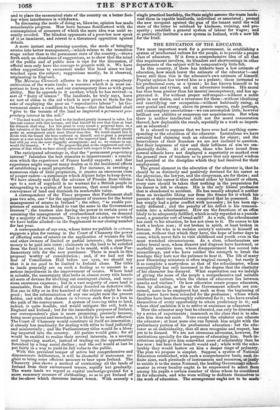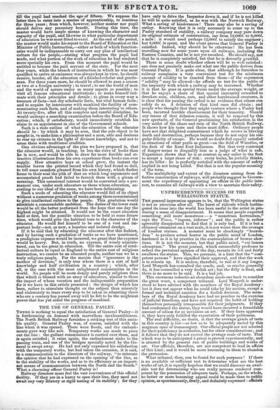THE EDUCATION OF THE EDUCATOR. THE most important work for
a government, in establishing a system of intellectual culture for the people, is to provide a proper class of educators. If it form a comprehensive idea of all that this requirement involves, its blunders and shortcomings in other departments of the subject will be comparatively little felt.
In this country, if there has hitherto been a low estimate of education, how much lower the estimate of the educator 1—and lower still than this is the educator's own estimate of himself. Popular opinion has viewed him as a pedant ; those intrusted to his professional care, as a tyrant ; he has known himself to be both pedant and tyrant, and an adventurer besides. His moral has thus been greater than his Mental incompetency, and has ag- gravated it. For without proper self-respect—without a noble pride in our duties, and a reverence for them—without idealizing and sanctifying our occupation—without habitually rising, at once genial and strong,. above its prosaic aspects, rude josthngs, and commonplace associations—we can accomplish little, however brilliant our abilities or numerous our acquirements. Rut when there is neither intellectual skill nor the moral consecration thereof, how deplorable the result, especially in a work so import- ant as education !
It is absurd to suppose that we have ever had anything corre- sponding to the education of the educator. Institutions we have certainly had claiming such an education for object; and the benevolence of their founders we are not inclined to question. But their largeness of view and their loftiness of aim we em- phatically doubt. At all events, those who have issued from normal schools have not displayed a superiority so marked over the general race of teachers as to prove that any special wisdom had presided at the discipline which they had received for their employment.
The grand element in the education of the educator is, that he should be as distinctly and positively destined for his career as the physician, the lawyer, and the clergyman, are for theirs ; and that when his career is thus selected either by himself or others, every care should be taken that nothing in the preparation for his eareer is left to chance. His is the only liberal profession that is abandoned to accident. He has usually adopted it neither from an invincible liking nor from the fitness for it which his parents or their representatives conceived that he possessed. He has simply had a grim conflict with necessity; he has been sig. ,1 nally defeated ; and the penalty of his defeat is his transmu- tation into a schoolmaster. How are the functions of an office likely to be adequately fulfilled, which is only regarded as a punish. ment, a genteeler sort of tread-mill? As a rule, the schoolmaster has sunk to his situation, he has not risen to it. He comes to his work a broken man ; if not broken in spirit, at least broken in fortune. He who is to reclaim society's outcasts is himself an outcast, without that which they have, the hope of better days to come, which never fails to visit childhood and youth even in the most wretched circumstances. As a class, schoolmasters are either brutal men, whom disaster and disgrace have hardened, or morbidly sensitive men, whom disappointment has soured into misanthropy, and who have neither the strength to break the bondage they hate nor the patience to bear it. The life of many poor Dissenting ministers is often tragical enough; but rarely is it so complete a martyrdom as that of the schoolmaster, whose susceptibility has only increased in the degree that the elasticity of his character has decayed. What expectation can we indulge of giving the mass of the people a comprehensive and suitable intellectual culture, when the choice of educators lies between quacks and victims ? Or how otherwise create proper educators, than by allowing, as far as the Government schools are con- cerned, none to be employed but such as from the beginning of their career have been intended for the profession ; whose whole faculties have been thoroughly cultivated for it ; who have availed themselves of every opportunity to attain proficiency in it; and whose chief ambition it is to arrive at eminence as educators ?
How the educator may best be educated, can only be determined by a series of experiments ; inasmuch as the class that is to edu- cate him does not exist. None except the edubator can educate the educator ; at least none else can furnish him aright with the preliminary portion of his professional education: but the edu- cator as an individuality, that all men recognize and respect, has yet to be formed. We are not strenuous advocates, however, for institutions specially for the purpose of educating him. Such in- stitutions might give him somewhat more of scholarship than he has now ; but here their benefit would end ; while with the scho- larship they would bestow on him a deeper tinge of pedantry. The plan we propose is simpler. Suppose a system of National Education established, with such a comprehensive basis, such de- finite aims, such plenitude of instruments and resources, as justly to entitle it to the name National, the leading Government school- master in every locality ought to be empowered to select from among his pupils a certain number of those whom he considered fit for educators, and who were willing to dedicate themselves to the work of education. The arrangement ought not to be made till the pupil had reached the age of fifteen. We suppose the latter then to enter into a sies of apprenticeship, to continue for three years ; from which,however, neither master nor pupil should derive any pecuniary benefit. During this time, the master would have ample means of knowing the character and capacity of the pupil, and likewise in what particular department of education he was most fitted to excel. At the end of the period, the master would make his report to the Board of Education or the Minister of Public Instruction,—either or both of which function- aries would be indispensable to carry out any plan of intellectual culture for the people,—stating what progress the pupil had made, and what portion of the work of education he had rendered more specially his own. From this moment the pupil would be entitled to become the paid servant of the state. For the next four years, while the branch of instruction in which he was most qualified to arrive at eminence was always kept in view, he should receive, besides, all the education of a finished scholar and gentle- man. For three years more, he should be allowed to pass a season or two at a foreign university ; to travel ; to see the world of man and the world of nature under as many aspects as possible ; to visit all famous educational institutions; make himself inti- mate with their principles and details • ' to glean in every way a treasure of facts—not dry scholastic facts, but vital human facts ; and to acquire by intercourse with mankind the facility of com- municating such facts, and of making them interesting to others. At twenty-five, after all this complete and careful discipline, he would undergo a searching examination before the Board of Edu- cation; which, if satisfactory, would immediately establish his claim to an appointment in one of the Government schools.
Such is a rude outline of what the education of the educator should be : by which it may be seen, that the sole object to be sought is, to make him a philosopher and a man, able and desirous to rear up citizens in the light of divinest knowledge, and not to cram them with traditional crudities.
One obvious advantage of the plan we have proposed is, that the educator would, in teaching, be less the slave of books than he is now, and would be able to draw far more forcible and at- tractive illustrations from his own experience than books can ever supply. How attentive boys at school grow, the instant the teacher leaves the printed record which they had found so dull, to tell some anecdote gleaned from his own history, which flashes home to their soul the pith of that on which long arguments and accumulated proofs had failed to furnish them with a gleam of meaning. This occasional interest would be converted into a per- manent one, under such educators as those whose education, ac- cording to our ideal of the same, we have been delineating. Such a mode of educating the educator would fail of its object without a numerous gradation of ranks among those commissioned to give intellectual culture to tke people. This gradation would stimulate a commendable ambition. The duties of the lower rank would be all the better performed from the hope that one day the highest might be attained. It would not be the exact situation held at first, but the possible situation to be held at some future time, which would give the habitual tone to the character of the educator. He would feel himself to be one of a vast and im- portant body—not, as now, a hopeless and isolated drudge. If it be said that by educating the educator after this fashion, and by having such a gradation of ranks as we have mentioned, a prodigious expense would be incurred, we grant that the expense would be heavy. But, in truth, no expense, if wisely adminis- tered, can be too great in education. Till the entire cost of intel- lectual culture be equal in England to the entire cost of religious instruction, we cannot be an educated people, neither can we be a truly religious people. For the maxim that " ignorance is the mother of devotion," is only true where there is a sort of half knowledge and half civilization in a country ; which, after all, is the case with the most enlightened communities in the world. No people will be more deeply and purely religious than that which is blessed with an army of educators, similar to those the import of whose vocation and the indispensable preparation for it we have in this article presented : the design of which has been, rather to stimulate thought on the subject than minutely and elaborately to trace every step to be taken in educating those who ere a century has passed away will be felt to be the mightiest power that has yet aided the progress of mankind.



























 Previous page
Previous page